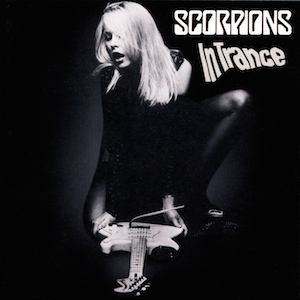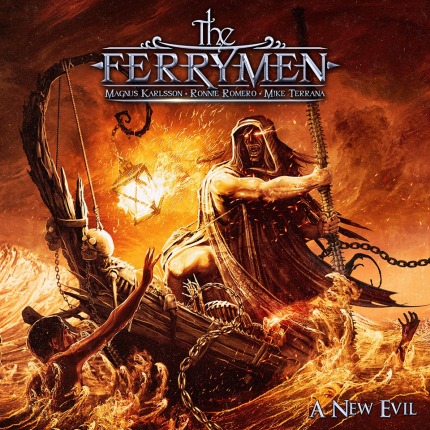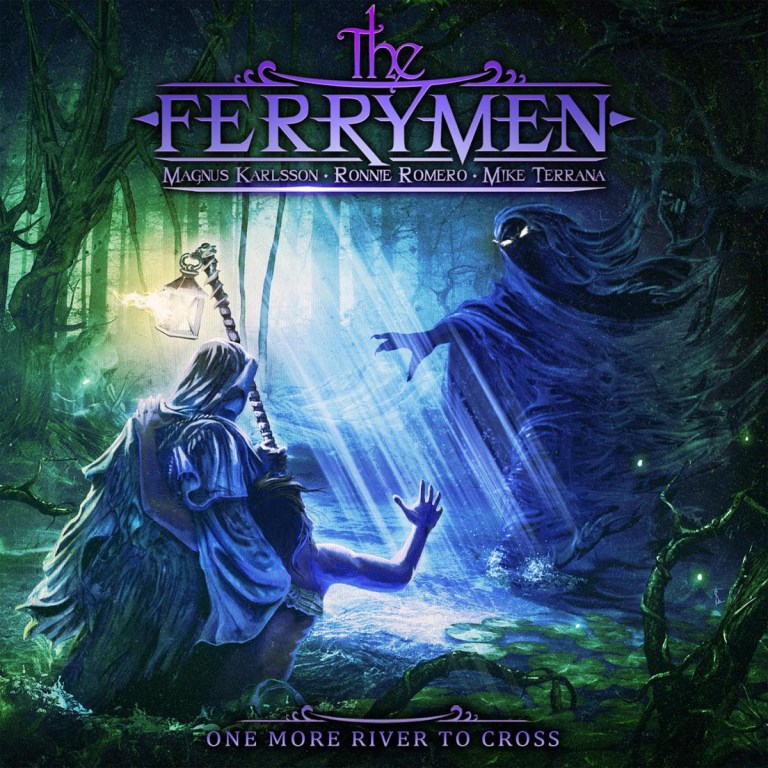Wednesday, March 26, 2025
Top 5 of 1975!!
Thursday, March 20, 2025
Retro Reviews - March 2025!
While working on my Top 5 articles, I ended up listening to a lot of new stuff. However, I figured I couldn't do a review for all of them, but here's a handful that I thought were worth talking about, partially because they let me carry on reviewing these bands' discographies.
Deep Purple - Deep Purple in Rock
While I've reviewed a handful of this band's albums, I'm certainly doing them out of order. In preparation for this one, I did listen to their first three albums, and they're just okay. Obviously, Jon Lord's neo-classical elements were neat, but it was clear that they weren't really doing anything too special quite yet. With a lineup change, things are certainly different, as the band really digs in hard on a louder, more intense sound.
Right away, new vocalist Ian Gillian makes an impact. Rod Evans wasn't a bad singer, but he wouldn't have been a good match for this shift into hard rock. Gillian takes command of the songs and gives them a ton of attitude. The rest of the band really turns it up as well, making some very loud and forceful tunes. Jon Lord and Ritchie Blackmore go back and forth with their solos, while Ian Paice rocks out with new bassist Roger Glover. I can definitely see why the band felt this was a restart for them, calling this iteration Mark II.
However, it's still rough in spots. Lord leans a little too hard on some atonal chords for his organ in spots, and the second half of the album isn't as strong, which is why it didn't make my Top 5 for the year. Still, it's all pretty solid, heavy-hitting blues rock. Songs like "Speed King" and "Child in Time" have cemented themselves in rock history, and the album sets the foundation for them to turn into one of the major hard rock bands of the era.
Scorpions - In Trance
Yup, it's time to pick up where I left off with this band. While the first two album had them still messing around with progressive rock ideas, here we have the band fully streamlined into a 70s hard rock sound. While I don't think they have their iconic sound quite yet, I can't deny this one had some very fun songs, and I'm kinda surprised it wasn't a bigger deal back then (on an international level, anyway).
Once again, Klaus Meine shows why he's one of the best of the business, his vocals majestically soaring over the songs, and the harmonies are very spot on as well. However, I do wonder if guitarist Uli Jon Roth doesn't take a bit too much of the spotlight. Some of the songs later on the album just feel like pieces for him to solo over, and not much else (including the instrumental track that closes the album). Still, what's here rocks pretty well, finding a spot between Black Sabbath, Deep Purple, and Uriah Heep (especially with those organs they use in the background sometimes).
As for standouts, the title track is the biggest, feeling like a mini-epic with how it builds, "Robot Man" is definitely on the quirky side, but it also has some good energy, and many of the tracks show Roth's range of guitar playing ability, with him playing both melodic and noodly parts quite well. Which is why it's strange that it feels like this album wasn't a bigger deal when it came out. I get that getting a record outside of Germany in the 70s may not have been easy, but I could see fans of Queen and Rainbow really digging this, between the theatrical tones and dynamic guitar work.
Uriah Heep - Return to Fantasy
Speaking of which, I'm still working my way through this band's discography! John Wetton of King Crimson (and would later start Asia) joins them on bass for this album. However, the band stays pretty consistent with what they've been doing recently, though with a few twists here and there.
For an album title that claims to return to the fantastical, the lyrics seem to focus on typical romantic stuff. I admit I would have liked them to bring back some of the ideas from Demons and Wizards. Nevertheless, what makes Uriah Heep is still around: the tight vocal harmonies, the prominent organ, now joined by more synths, and some solid rocking grooves. Wetton seems to bring a little funk with him, as well. The title track and "Showdown" show the band still has their chops, both in performing and song-writing. "Beautiful Dream" gets a bit weird, but in a good way, as the song builds well. And the closer "A Year and a Day" has some good dynamics and transitions, getting a bit anthemic.
However, some songs end up being just filler. "Your Turn to Remember" is a pretty generic blues rocker, "Why Did You Go" has this somber vibe that I think they've done better elsewhere, and "Prima Donna" has this horns section and bombastic energy that it didn't even feel like Uriah Heep! I'm not sure why they went with that for a single. Overall, it's decent stuff, about as good as previous albums, if perhaps a little less inspired, as it seems like they're hitting the same notes as before.
Queen - A Night at the Opera
Well here's a bit of a throwback. Much earlier in my blog, I started reviewing Queen's discography, hoping to get a little deeper into their catalog. After doing the first three albums, I guess I dropped the ball. Fortunately, these Top 5 articles I'm doing have inspired me to pick this band up again. With all the 70s rock I'm listening to, it's hard to imagine the decade without Queen, after all.
Of course, this album is probably their best known, featuring some of their biggest hits, like "You're My Best Friend" and the immortal "Bohemian Rhapsody." Getting into the deeper songs, we see more of their humorous and whimsical side, with "Lazing on a Sunday Afternoon," "Seaside Rendezvous," and "Good Company." These sound like some of the Beatles' later experiments with a bouncier sound, but Queen gives them just enough pomp to make them their own. As for more of their rock side, while "Sweet Lady" does feel like filler, "Death on Two Legs" has to be one of their most aggressive songs, and "The Prophet's Song," while maybe a little too long with the neat a capella section, is them at their most epic and theatrical. Those looking for hard rock with plenty of flair would find little competition in the 70s.
Reviewing this album maybe a little redundant, as it is so well loved, but like I said, I wanted to go beyond the handful of tracks that I hear on classic rock radio all the time. While previous albums have decent, I can definitely say this one is nearly the complete package, a joy to listen to all the way through, and one of the best albums of 1975. This Top 5 article I'm working on is gonna be hard to decide!
Wednesday, March 12, 2025
Catching Up with The Ferrymen!
After I enjoyed doing my Catching Up article with The Brothers of Metal, I decided to repeat the concept for another modern metal band that has always been on my radar, but haven't spent the time to review any of their work. Largely pulled together by Frontiers Records, it features Magnus Karlsson (of Primal Fear and various symphonic metal projects), Mike Terrana (formerly of Masterplan and Malmsteen, among others) and the voice himself, Ronnie Romero (who also has plenty of projects as well, but was best known as the singer for Ritchie Blackmore's sudden revival of Rainbow in 2015). With a strong pedigree and a flair for the dramatic, they've released four albums now, including one from earlier this year! What better time to catch up with this band than now?
The Ferrymen (2017)
With the introduction out of the way, let's get to the music. Right off, the group settles into a melodic heavy metal vibe, similar to the likes of Dream Evil, Silver Bullet, and Last in Line. There are more symphonic flourishes though, which makes them much like other Frontiers supergroup projects, such as Allen/Lande. In short, it sounds like what would happen to Dio's sound if he kept going and added more strings.
Speaking of which, Ronnie Romero wails his heart out, sometimes sounding like the classic singer, but also with a bit of grit, making me think of Jorn or even Robin McAuley at times. Nevertheless, he's great here, and the other two members are in top form. Mike pounds out the rhythm with ease, and Magnus gets to show off both his lush arrangements and guitar prowess, easily going between shreddy and melodic as the song needs. The songs are pretty solid all the way through, though I do think "Eternal Night" is a bit of a clichéd power ballad.
I'm not quite sure why they're listed as "Power Metal" on the Metal Archives, as they really are more like a symphonic-powered traditional metal band (again, like Allan/Lande). However, I will say that I like the more uptempo songs, like "Still Standing Up," "Eyes on the Sky," and the excellent closer "Welcome to the Show." I also liked "One Heart," the other power ballad on the album, as I think it builds well. Overall, it's a good album to build on, even though they don't really deviate from what they established here.
A New Evil (2019)
So I actually featured two singles from this album back when I was more focused on music videos. I thought were pretty good, but I guess they weren't enough to get me to check out the rest. Now that I'm picking up the slack, this album carries on their journey by bringing another solid slab of symphonic-tinged epic metal.
That does make it difficult to find much that's meaningful to say. The production is still big and powerful, the trio continue to play well, and it's easy to just get lost in the escapism of the sound. I don't know if this one is better than the first one, but there is still plenty to like. The opener "Don't Stand in My Way" start things off well, and the two singles I mentioned above, "A New Evil" and "No Matter How Hard We Fall," remain strong pieces. As for the ending, "You Against the World" has some strong Primal Fear vibes that I liked, and "All We Got" is a nice, upbeat, AOR-style closer. I do think the symphonic elements are stronger, but honestly, they're sticking with what they have, as it's certainly working for them.
One More River to Cross (2022)
Three years later, and not much has changed. Magnus shreds, Mike pounds, and Ronnie soars. So is there anything different? Well, I do think the symphonic elements have been boosted again, really going for some bombastic sections in a few songs. I also think the songwriting has slightly shifted in more of an AOR direction, but even then, there's still plenty of chugging riffs and shredding solos to keep this squarely in metal territory. Honestly, though, this is just me splitting hairs. The Ferrymen have their sound, and they aren't changing it for anyone.
Once again, I like it when the bring the energy. "City of Hate" gave me some Karevik-era Kamelot vibes, with the darker tone and aggressive riffing. The title track (while not a cover of a great Alan Parsons Project song) ends up being a very cinematic song, with the orchestrations really bringing the power. "Bringers of the Dark" and "The Last Ship" have some tight riffing and solid choruses. Overall, it's another consistent album that doesn't really have a bad song, which means its about the same as the first two albums. No need fix what isn't broken, after all.
Iron Will (2025)
I wonder if it isn't a bit of a mistake to have binged these albums. If I had been listening to them as they came out, I think each one would feel more novel. While I can detect some small differences, these albums are pretty interchangeable in their sound. Of course, there's nothing wrong with being consistent, especially in quality.
I think on this album they do a better job of embracing their symphonic metal nature, really making the orchestrations a part of the song rather than just some epic flavor in the back. Still, this is a minor detail, as the trio still do what they do best. I will say that, as the albums have gone on, Ronnie isn't trying to sound like Dio quite so much, which is fine. He's got a great voice that stands on its own quite well. The songs have become pretty formulaic at this point, with Magnus's solos predictably drifting between melodic and shreddy. Not that I want each song to be completely different, but it's easy to fall into a single groove with this album (as with the others), so those expecting more variety might be disappointed.
Still, there are some stand out tracks. The title track and "Dust to Dust" have some traditional metal grit, while the opener "Choke Hold," "Adrenaline," "The Darkness That Divides," and "Mind Games" shows their strong symphonic side, and the sentimental "Dreams and Destiny" adds in some folky flutes for a good power ballad. However, the best track is "Mother Unholy," with that slow, ominous riffing, making me think of Lamenting of the Innocent by Sorcerer. With the church bells and choirs singing in Latin, it makes for a very dramatic song and the highlight of the album. As a whole, I don't know if this will be a Top 5 contender for 2025, but I do consider it another solid offering from a band that clearly knows what they want to do and do it well.
While that was another fun, short discography to binge through. One on hand, it's hard not to feel like this is just another side project for the three talented members, but I can't deny that what they've made is some above average melodic metal. As I was listening through, I did wonder if this hasn't become more of Magnus's thing, as his orchestrations and arrangements got bigger and more epic (not that I think the other two members were slacking at all). Still, I'm hard pressed to really say anything was particularly bad, and any of the four albums are recommendable to anyone missing the kind of classic 80s metal melodrama that Dio's band used to provide, backed by some well-made symphonic flourishes.

_front_cover.jpg)



.png)


.jpg)



